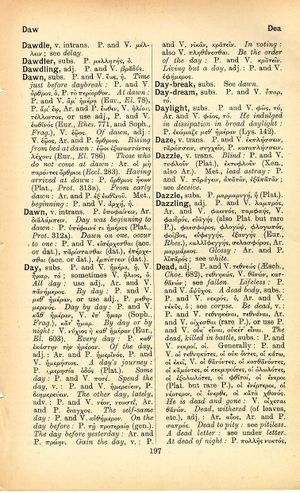day
γενέται καὶ πατρὶς ἔχουσιν ὀστέα → my parents and my fatherland have my bones
English > Greek (Woodhouse)
subs.
P. and V. ἡμέρα. ἡ, V. ἦμαρ, τό; sometimes V. ἥλιος, ὁ.
All day: use adj., Ar. and V. πανήμερος.
By day: P. and V. μεθʼ ἡμέραν, or use adj., P. μεθημερινός.
Day by day: P. and V. καθʼ ἡμέραν, V. ἐπʼ ἦμαρ (Soph., Frag.), κατʼ ἦμαρ.
By day or by night: V. νύχιος ἡ καθʼ ἡμέραν (Eur., El. 603).
Every day: P. καθʼ ἑκάστην τὴν ἡμέραν.
Of the day, adj.: Ar. and P. ἡμερινός, P. and V. ἡμερήσιος.
A day's journey: P. ἡμερησία ὁδός (Plat.).
Some day: P. and V. ποτέ.
Spend the day, v.: P. and V. ἡμερεύειν, P. διημερεύειν.
The other day, lately, adv.: P. and V. νέον, νεωστί, Ar. and P. ἔναγχος.
The self-same day: P. and V. αὐθήμερον.
On the day beforc: P. τῇ προτεραίᾳ. (gen.).
The day before yesterday: Ar. and P. πρώην.
Gain the day, v.: P. and V. νικᾶν, κρατεῖν.
In voting: also V. πληθύνεσθαι.
Be the order of the day: P. and V. κρατεῖν.
Living but a day, adj.: P. and V. ἐφήμερος.

